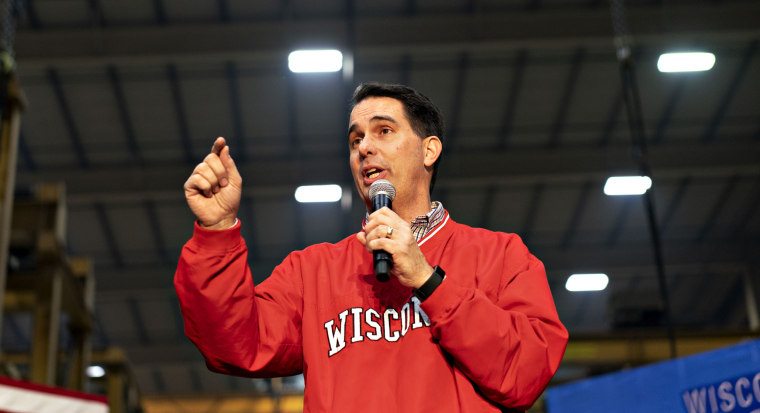Outgoing Wisconsin Gov. Scott Walker, a Republican, signed into law a sweeping set of bills on Friday passed by the lame-duck GOP-controlled legislature to limit the powers of the incoming Democratic administration.
The legislation weakens the authority of the incoming Democratic governor and attorney general, and will restrict early voting. Walker dismissed complaints that he was turning aside the will of voters in last month's election and said not to believe what he called the “hype and hysteria” about the measures.
"The overwhelming executive of authority I have as governor today will remain constant with the next governor," Walker said at a Friday news conference.
Walker is in his final weeks as governor after losing a bid for a third term to Gov.-elect Tony Evers, the state schools superintendent.
Evers, in a news conference Friday, excoriated Walker for not vetoing the legislation, and charged that if the Republican had won, the new laws would never have been passed.
“It flies in the face of the people of Wisconsin wanting people to have bipartisan solutions, wanting to have less rancor, wanting to have less divide and conquer and what we have is a special session ... where just the opposite happened,” Evers said.
“Believe me, I understand that we have to have a strong legislative branch and we have to have a strong executive branch and a strong judicial branch,” Evers added. “But the fact of the matter is this legislation would not have happened if Governor Walker would have been elected instead of me.”
Evers said that his team will look at all of their options going forward as he makes his transition into office.
“I will be reviewing our options and will do everything we can to make sure that the people of this state are not ignored or overlooked. Wisconsinites deserve a government that works for them and they deserve their elected officials to be willing to set aside partisanship and political ambition to deal with the pressing issues that we have,” he said.
Among other changes, the bills would prevent the governor from scrapping the state's Medicaid work requirements and hamper his ability to withdraw Wisconsin from lawsuits like the one challenging the Affordable Care Act, as well. Both Evers and Democratic Attorney General-elect Josh Kaul campaigned on withdrawing Wisconsin from a multistate lawsuit that seeks to repeal the Affordable Care Act.
It also limits gubernatorial appointments to an economic board, and require legislative sign-off for the governor to make changes to certain programs and for the attorney general to settle certain lawsuits.
The bill would also limit early voting in the state after a previous attempt to cut early voting was found unconstitutional in federal court, so the legislature is trying again with a slightly more expansive approach.
After Republicans rammed the bills through in the lame-duck session earlier this month, furious Wisconsin Democrats labeled it a naked partisan power grab that would lead to gridlock and lawsuits. Evers said then that while calling the move a "coup" might be "strong," he agreed with Democratic criticism that the effort was a direct response to Republicans losing top statewide offices.
Walker said on Friday that the gubernatorial appointments to the state's economic board were limited because he believes it should not be a partisan position. He also said that the early voting component was to bring uniformity to the process, rather than to restrict voters.
Republican lawmakers have also brushed aside criticism, arguing that the legislature simply wants to correct the balance of power in the state government.
A similar effort is occurring in Michigan, where Republican lawmakers are also scrambling to limit the power of state executives before Democrats are sworn in as governor and secretary of state.
Independent state government experts and political scientists warned earlier this month that the lame-duck moves smack of election nullification and indicate a worrisome trend.
"I do think that once you do see a number of states move in this direction, if they have any level of success, we’re going to see more of them try to do it. And it’s very disturbing to me," Norman Ornstein, an expert at the conservative think tank American Enterprise Institute, previously told NBC News. "Once you start down the path of diluting, obviating, nullifying the results of an election, it’s very hard to pull back from that."
Other national and statewide experts also told NBC News they had never seen such efforts like the ones in Wisconsin and Michigan before — and said that it could usher in a new level of toxicity at the state level.
"Until recently, no party has tried to hamstring their opponents' future power to the way the Republicans are doing it now," John Chamberlin, professor emeritus of political science and public policy at the University of Michigan, said.
He added, "They are a bad sign that state politics is being infected by the toxic national political environment."
Rick Hasen, a law and political science professor at the University of California, Irvine, called it "norm erosion" and suggested it could have something to do with President Donald Trump.
"It’s hard to know how much Trump is the cause or the effect, but certainly there’s been a lot of norm erosion in terms of how we function in our democracy," Hasen previously told NBC News.

